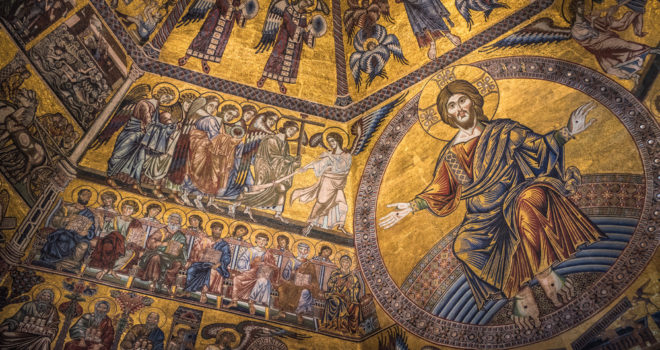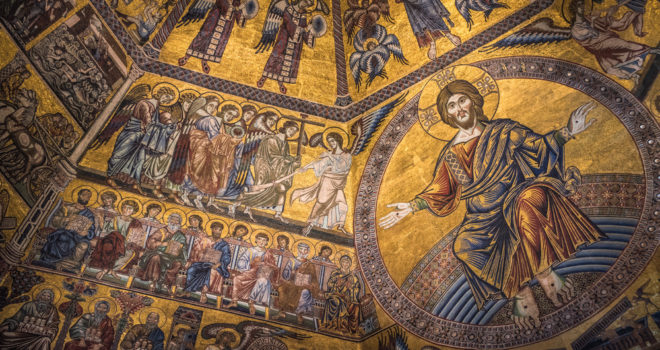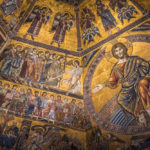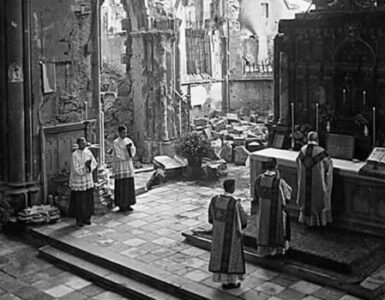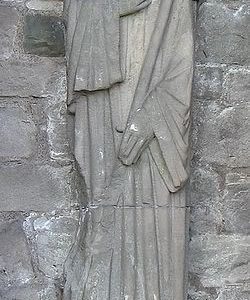Let us hold fast the confession of our hope without wavering, for He who promised is faithful.
-Hebrews 10:23
In His Sermon on the Mount, Jesus speaks very movingly about the need to rely on our Father’s loving care: “Do not be anxious about your life, what you shall eat or what you shall drink, nor about your body, what you shall put on. Is not life more than food, and the body more than clothing? Look at the birds of the air: they neither sow nor reap nor gather into barns, and yet your heavenly Father feeds them. Are you not of more value than they? And which of you by being anxious can add one cubit to his span of life? . . . Therefore do not be anxious, saying, ‘What shall we eat?’ or ‘What shall we drink?’ or ‘What shall we wear?’ For the Gentiles seek all these things; and your heavenly Father knows that you need them all. But seek first His kingdom and His righteousness, and all these things shall be yours as well.” (Matt. 6:25-27, 31-33)
We are completely dependent on God’s mercy and grace. We must trust that God wants to save us and that He will give us the resources we need to cope with life’s challenges and to achieve our eternal destiny. The saints had a profound awareness of the Lord’s presence in their lives — so profound that they didn’t seek miraculous confirmation or run after wonders and signs.
Once, during the reign of St. Louis IX of France, when Mass was being said in the palace chapel, a miracle occurred during the Consecration: Jesus appeared visibly at the altar, in the form of a beautiful child. Everyone there gazed on Him in wonderful awe and contemplation, recognizing this miracle as a proof of the Real Presence. Someone hurried to tell the king, who was absent, so that he might come and witness the event. But Louis declined, explaining, “I firmly believe already that Christ is truly present in the Holy Eucharist. He has said it, and that is sufficient; I do not wish to lose the merit of my faith by going to see this miracle.”
God meets our spiritual needs, just as He promised. He also provides for our physical needs, as long as we place our trust in Him.
St. John of the Cross, on being informed by the cook in his monastery that there was no food for the following day, answered, “Leave to God the care of providing food. Tomorrow is far enough off; He is well able to take care of us.” The next morning there was still no food — until a wealthy benefactor came to the door. He explained that he had dreamed the previous night that the monks might be in need and had brought enough food and supplies to sustain them, just in case that was so.
Other saints had similar experiences. In the early nineteenth century, Bl. Anne-Marie Javouhey established a religious congregation, over the strong objections of her father. She and the other sisters were running an orphanage, and when they ran out of money for food one day, Anne-Marie went into church to pray: “I need help. I know that I have been imprudent, and perhaps I have gone beyond Your will in many ways. But I have done it for the children. They are more Yours than they are mine. If I have made mistakes, punish me — not them. I beg You, don’t forsake them. Please, please help.” Anne-Marie then heard the voice of the Lord clearly: “Why have you come here to expose your doubts? Have you no faith in me? Have I ever disappointed you? Go back to the children.” There with a wagonload of food was her father, who said, “I don’t know why I am doing this, but I suppose I can’t let you starve.” Anne-Marie realized that God had not only tested her faith, but had also confirmed His loving care for her — for indeed, moving her unwilling father to bring assistance for all the orphans and sisters was perhaps a greater miracle than if He had stocked the pantry shelves with food suddenly created out of nothing.
St. John Bosco amazed many people by managing to care for a large number of orphans and other boys apparently without sufficient resources. Each time his assistants told him that dire financial problems could no longer be put off, he assured them, “God will provide” — and in every instance, he was right.
Another famous Italian, St. Frances Cabrini, showed this same childlike trust during her long ministry in the United States. She and the sisters of her religious order encountered many difficulties in their labors on behalf of poor Italian immigrants, but they managed to create and staff many schools, hospitals, and orphanages. Whenever a problem arose, Mother Cabrini would ask, “Who is doing this? We — or the Lord?”
Trusting God means believing in His care for us even when evil seems to be gaining the upper hand — a point understood by the sixth-century abbot St. Stephen of Rieti. When a wicked man burned down the barns holding all the monastery’s corn, the monks exclaimed to Stephen, “Alas for what has come upon you!” The abbot answered, “No, say rather, ‘Alas for what has come upon him that did this deed,’ for no harm has befallen me.” As Stephen knew, God’s providential care is far greater than any human treachery.
According to St. Albert the Great, “The greater and more persistent your confidence in God, the more abundantly you will receive all that you ask.” This point is echoed by St. Teresa of Avila, who reassures us, “God is full of compassion and never fails those who are afflicted and despised, if they trust in Him alone.”
If, indeed, we are trying to do God’s work, instead of our own, we need not fear the results. The Lord is an expert at solving problems and providing for us in our need (even to the point of working miracles, if need be). The one thing He can’t do, however, is force us to trust in Him. If we freely choose to do this, we’re cooperating with His grace, and the results are guaranteed to be wonderful and amazing.
For Further Reflection
“Do not fear what may happen tomorrow. The same loving Father who cares for you today will care for you tomorrow and every day. Either He will shield you from suffering, or He will give you unfailing strength to bear it. Be at peace, then, and put aside all anxious thoughts and imaginings.” — St. Francis de Sales
“A few acts of confidence and love are worth more than a thousand ‘Who knows? Who knows?’ Heaven is filled with converted sinners of all kinds, and there is room for more.” — St. Joseph Cafasso
“Those whose hearts are enlarged by confidence in God run swiftly on the path of perfection. They not only run, they fly; because, having placed all their hope in the Lord, they are no longer weak as they once were. They become strong with the strength of God, which is given to all who put their trust in Him.” — St. Alphonsus Liguori
Something You Might Try
St. Rose of Lima was afraid of the dark — a trait she inherited from her mother. Her mother and father once went looking for her after dark. This had an effect on Rose, who thought, “How is this? My mother, who is as timid as I, feels safe in the company of her husband. And am I afraid, accompanied by my Spouse, who without ever leaving me, is continually at my side and in my heart?” From then on, St. Rose no longer feared anything.
You can benefit from her experience by continually reminding yourself that Jesus is with you, which means that you have nothing to fear.
Trust in God even when things seem bleakest
A very upset mother superior once came to St. Joseph Cottolengo, who asked, “What’s the trouble, Sister?” She answered, “I have so many things to buy, Father, and this is all the money I have.” St. Joseph agreed that it was a very small sum, so he took the money, tossed it out the window, and consoled the shocked nun: “That’s all right; it has been planted now. Wait a few hours, and it will bear fruit.” Later that day, a woman came to see the saint and donated a large sum of money — more than enough to meet the community’s needs. Sometimes you have no apparent options, but — like St. Joseph Cottolengo — you can always choose to trust in God, and this allows Him to help you, often in ways you can’t foresee.
✠
This article is adapted from a chapter in Fr. Esper’s Saintly Solutions to Life’s Common Problems, available from Sophia Institute Press.


